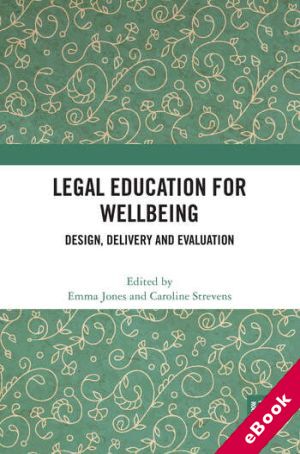
The device(s) you use to access the eBook content must be authorized with an Adobe ID before you download the product otherwise it will fail to register correctly.
For further information see https://www.wildy.com/ebook-formats
Once the order is confirmed an automated e-mail will be sent to you to allow you to download the eBook.
All eBooks are supplied firm sale and cannot be returned. If you believe there is a fault with your eBook then contact us on ebooks@wildy.com and we will help in resolving the issue. This does not affect your statutory rights.
This book aims to assist legal educators and law schools in integrating wellbeing within the design and delivery of the legal curriculum. It also encourages the evaluation of wellbeing-related initiatives, to develop an evidence-based, sustainable approach to its inclusion.
The contributions to this volume each focus upon different aspects of wellbeing and the curriculum, including the applications of vulnerability and social identity theory, the role of transitions and inductions, the implementation and evaluation of law school wellbeing initiatives, reflections on both the Socratic method and assessment, the results of a longitudinal student study and a consideration of the legal profession’s perspective. They contain both theoretical and empirical evidence to support the development of wellbeing-informed teaching and learning and foster positive interactions and experiences for both staff and students. Taken together, and coupled with international perspectives, they provide evidence and examples to support a holistic approach to wellbeing in legal education which moves beyond simply ameliorating damaging impacts and instead identifies meaningful routes to fostering positive wellbeing.
This volume will be of interest to legal academics and others with an interest in legal education, including legal professionals and law students. It will also appeal to those who have an interest in integrating wellbeing into the curriculum within higher education.
This book was originally published as a special issue of 'The Law Teacher'.